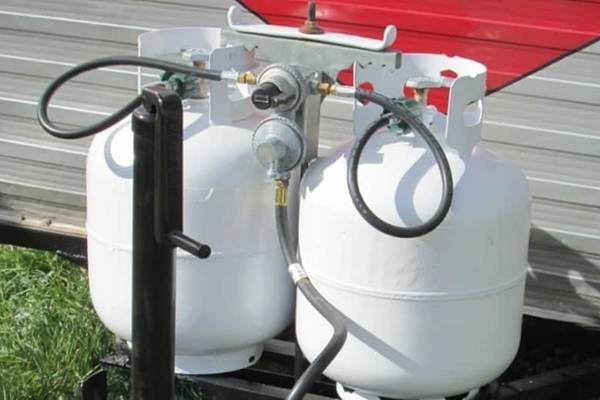
Propane Tank Rattles Inside: Why Is My Propane Tank Rattling?
Propane tanks are well-built but sometimes things can go wrong. The problem is you cannot see inside the tank to see if the rattle is a major or minor problem. If everything is working right, then it may just be a minor issue, and not to worry
One reason why you hear a rattling sound is that a float got detached and is moving about the inside of the propane tank. The way to check this is to see if your level gauge is working or not.
To learn more about his situation, just continue to read our article. It explores this topic so you can have a little peace of mind and know how to handle the rattle when you hear it, Take a few minutes to see how this information will help you solve your rattle problem.
Should My Propane Tank Make Noise?

No, it should not. It is one of those silent workers that quietly goes about doing its job without drawing attention to itself. When you hear a noise, that sound is alerting you to a problem inside or outside your tank.
Once you turn the propane tank, you should not hear anything if it is functioning properly. But there are different sounds and they are not all related to the same problem. Once you recognize the sound, you should be able to know what to do next.
Often a trip to a propane dealer will be the solution in most cases. They have trained experts who can handle the different noises and fix the problem inside the propane tank.
Why is My Propane Tank Rattling?

If you hear a rattling sound inside your tank, there are two sources for this noise. The first noise could be a float that has broken free from its place and moves about when you use the stairs or walk around your trailer or RV.
Or, there is an imbalance of air and gas inside the tank. But this only sounds when you have the propane tank turned on. Look at the flame to see if this is the correct source.
A blue flame with a yellow tip is normal but an all yellow or all white flame means you need to call a technician to fix it. Don’t try to fix it yourself. It is best to let the trained professionals handle it.
The Propane Tank Has a Rattle Inside

There are only 2 real sources for this sound and we have addressed both in the previous section. The solution to the first source would also be to take the propane tank to the technician and let them handle it.
They will have the right tools to drain the tank of the gas safely as well as the proper replacement parts to fix the float or the gauge, whichever is broken.
One note, if everything is working properly and you have the right flame at your devices, then you can possibly wait till the tank is near empty or empty before having it fixed.
If it is the overfill protection valve that has broken, you should get that fixed as soon as possible. LPG dealers should have a technician on staff to handle these issues.
The Propane Tank Makes Noise When Moved

The noise you may hear in this situation may well be a gurgling or humming sound. This arrives when the tank has been over-filled and you are moving it. The gas is moving when the tank moves and the excess gas could be finding a way out of the tank.
When you overfill a propane tank, there will be too much pressure inside. The way to confirm this is to check the flame on one of your appliances. If it is lower than usual, you need to have a dealer release the excess pressure.
Also, you may have air trapped somewhere in the system and that issue will also require going to the pros to get it solved.
Propane Tank Making Noise After Filling

This would be due to over-filling and the tank is getting too much pressure inside. This is not a good situation to be in as too much pressure can end up in an explosion.
But if the sound is a hiss, then there is a leak somewhere and you will need to replace the tank with a newer model. You are not going to be able to fix the leak yourself even if you do find it.
Make sure to turn off all appliances and other devices that use the tank as their source of energy. Then call the dealer to send someone to come out and fix it.
Propane Tank Regulator Noise

The regulator may make a hissing noise if there is a leak somewhere in that part. And the previous instructions will help you with solving that problem. Most likely you would need a new regulator.
Or there is air trapped inside or the regulator is vibrating for some reason. In either case, you would need to have the technician fix the problem. The same solution will be needed if the tank was over-filled. The regulator making noise will be a sign that this is the potential source. Too much pressure will affect the operation of the regulator causing it to vibrate or make some other sound.
Some Final Words
When it comes to propane and propane tanks, we are not going to provide any DIY solutions. Working with propane is very risky and it is best to leave the repair work to those who have been trained in propane and propane tank repair.
Plus, you may not have all the proper tools to handle the different problems associated with the different noises these tanks can make. There should be a propane dealer near you that can handle the problem if you take it to them.
Or they can send someone to your location if you are close enough.

